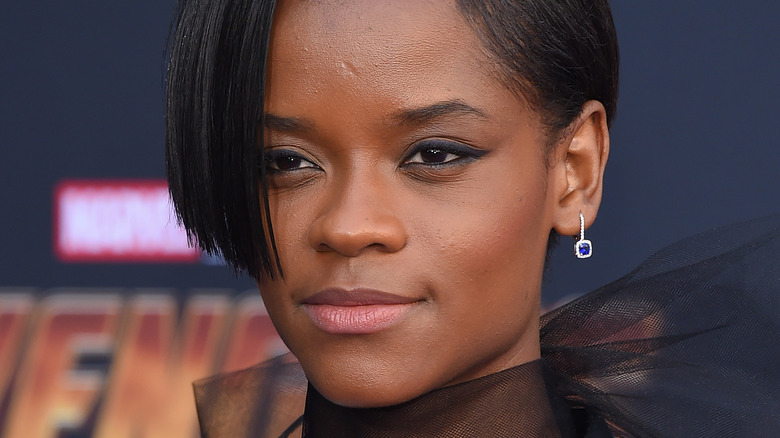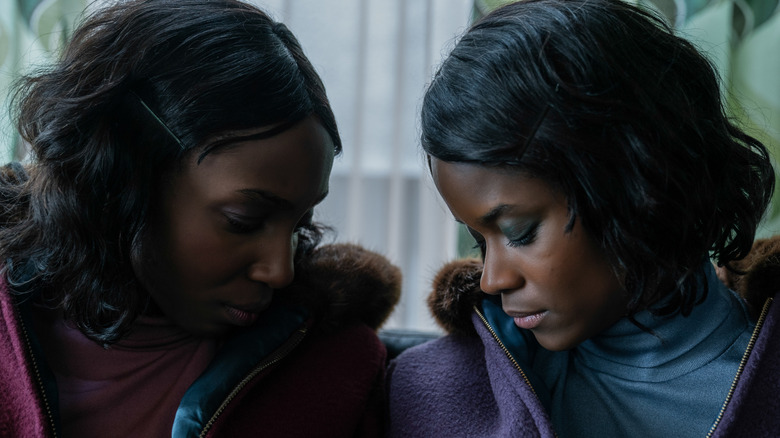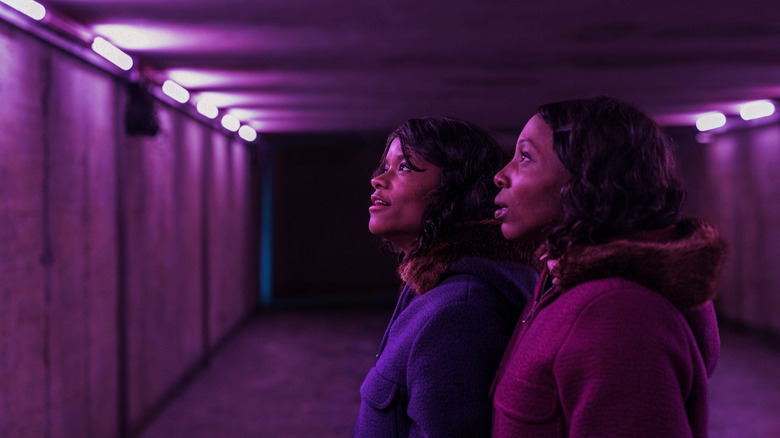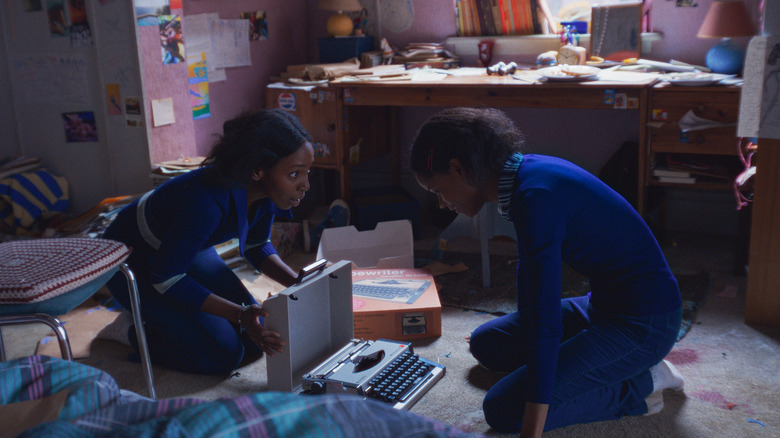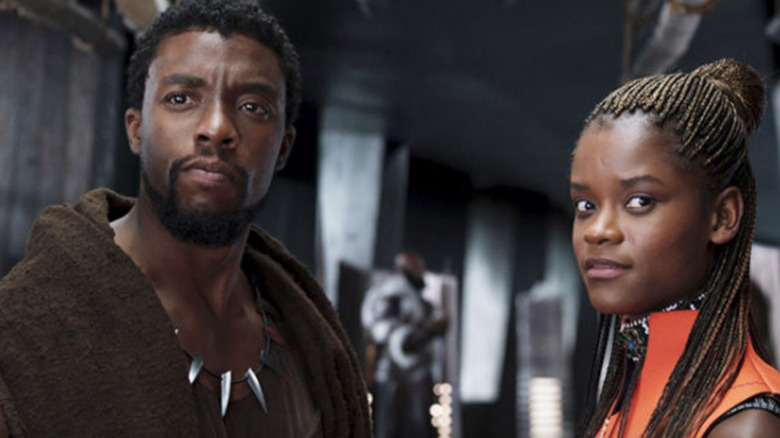The Silent Twins' Letitia Wright Discusses The Movie's Nuances - Exclusive Interview
Few films are more hard-hitting than movies based on impactful true stories. Letitia Wright's new film "The Silent Twins" dives deep into the lives of whimsical writers June (Wright) and Jennifer Gibbons (Tamara Lawrance) — and their journey from not speaking to getting placed in a psychiatric hospital for 11 years. Determined to make the film as authentic as possible, Wright and the rest of the cast, crew, and creatives read the self-titled book by Marjorie Wallace, an investigative journalist determined to tell their story.
Wright and Lawrance expertly bring a compassionate intensity to their roles, and Wright is no stranger to the big screen. Outside of her significant role as Shuri in "Black Panther" and other MCU films, she's had roles in "Sing 2," "Ready Player One," and "Death on the Nile." Wright also has more than a few TV roles on her resumé, including stints on "Small Axe," "Black Mirror," and "Doctor Who." She even appeared in Drake's music video for his song "Nice for What."
Wright spoke to The List in an exclusive interview where she discussed the importance of telling the Gibbons twins' story, why mental health is so essential to depict onscreen, and how much research went into the project. She also reminisced about working with Chadwick Boseman, the impact he's had on her life, and how the cast of "Black Panther: Wakanda Forever" is keeping his memory alive.
Giving June and Jennifer a voice
"The Silent Twins" is based on a true story. How much research did you do on the story of June and Jennifer and their writing?
A lot. I did a year's worth of extensive research — myself and Tamara [Lawrance]. Zoom sessions, accent sessions, movement choreography, [and] a lot of research [from] our director. Every department had to read the book. Whether you [were] a cameraman, lighting, or the person doing the AD, you had to read the book. Everybody was very in tune with research for about a year, and then we made it.
Much of the film tackles mental health and the treatment of neurodivergent individuals. You've been open about your own journey with depression, so what stood out to you about this role in that regard? Why do you think it's so important to normalize and tell stories like these?
I connected with the story because it was different [from] other stories [that are] out there. Why was it different? Because we are witnessing through this movie the misdiagnosis of two young Black women who did nothing close to heinous crimes but were placed in a psychiatric hospital for 11 years. That's an incredible injustice that was done to them.
Our film, in particular, looks at the consequences of misdiagnosing someone — the consequences of not taking time to understand an individual and boxing them [in] and putting them away, and then using the things of the misdiagnosis to cure them, but actually, it causes more harm. Our film dives deep into that.
It's important to tell stories like the one that we're doing with "Silent Twins" so that people who have gone through situations like this can feel seen, and also, we educate each other as a society. The more meaningful the story, the more impactful the story [and] the more [we] as a society can grow and learn.
The perils of misdiagnosis
The psych ward portion of the film jumped out at me because the twins were there through the early '90s, and I think a lot of people don't realize how counterproductive and punishing many harsh mental health services were just a few decades ago, and even still today. How do you think films like "The Silent Twins" can help spread awareness about the changes that we need to make in the way that we treat mental healthcare, both in the U.S. and throughout the world?
That is a loaded question. With our movie, we're not trying to cast any judgment on psychiatric hospitals or mental health institutions. That's not our aim. Our aim is to look at the society in which June and Jennifer grew up that failed them. I feel that they were put with individuals who weren't healthy mentally and [who] did crimes that are really, really problematic. When we explored this story, we [saw] how, in a way, innocent their crimes were, how childish their crimes were: stealing pencils and papers and sweets. On top of the other things that took place, that all came together to put them away.
Our film looks at the consequences and the problems of putting everybody in one box and not fully trying to understand the individual and what they're going through. So our film is not a dig at any mental institution. Our film is looking specifically at what [was] done to the twins. Unfortunately, they became a part of [an] environment that they should have never been a part of in the first place, and we see how that plays out in their life and causes their mental health to go down instead of [healing] them.
If you or someone you know needs help with mental health, please contact the Crisis Text Line by texting HOME to 741741, call the National Alliance on Mental Illness helpline at 1-800-950-NAMI (6264), or visit the National Institute of Mental Health website.
From Black Panther to The Silent Twins
I love some of those whimsical scenery shots that you guys did [between] the more intense [moments]. What were those scenes like to film in getting into the headspace of that childlike wonder?
That was fun because it was like an interpretation of their imagination. It was like a nod to them, like, "We see you. We see your writing, and we want to use our camera in a way to create imagery and a life that your words did for us." Those are the twins, that's their experience, that's what they felt, and we [tried] to make [it cinematic], which was fun.
"The Silent Twins" is very character- and emotion-driven between June and Jennifer, with not too many set locations or costume changes. How does filming a movie like this differ from larger-than-life roles like Shuri with massive battle sequences, huge sets, and a significant amount of action?
Great question. The latter has way more money. Performers, we are doing this all with love and [a few] pennies to rub together, but we're making it work.
I don't really see the comparison when I work, or I don't really compare the two mediums or levels or platforms or films that I do, because I always just try to tell the truth in each of them. I enjoyed being Shuri and having a big set. That's always fun. It shows how imaginative we can be with some good backing and finance behind us. But ["The Silent Twins"] shows how cost-effective [and] intentional we can be on the independent art house film sets. I love both.
A love letter to Chadwick Boseman
Chadwick Boseman has made such an impact on the MCU and the world at large. What are some of your fondest memories with him, and what lessons did he teach you about life and acting that you carry with you?
I learned so much from my brother Chad. He's very regal. He actually is a king, unbeknownst to everybody else. If you didn't know this, now you know. He's actually a king. He's so regal in the way he carries himself. I loved how intentional he was about the projects that he picked, and that's something that I'll carry with me for the rest of my life. I want to emulate that. I want to emulate picking work that means something.
Now that you're filming "Wakanda Forever," what have filming and the set been like in carrying on this legacy without him?
It's difficult, but we are trying to take it one day at a time. We're trying to give ourselves the healthy space to heal and grieve and to continue his legacy as best as we can. I'm excited for people to see the film. Once they've seen "Silent Twins" and see[n] the adventure that is the life of June and Jennifer Gibbons, they can hop over to Wakanda and see what's happening there.
Can you tease anything that we might expect from "Wakanda Forever" and Shuri's role? And what do you hope fans take away from that?
Okay, I'm about to give you the whole plot of the film. Are you ready? I love how you laugh like you [don't] believe I would do it. Damn it. We're just that secretive. I can't give anything away. All I can say is that it's going to be really fun and it's like a beautiful love letter to our brother, to carry on what you started, and I hope you guys enjoy it.
Are there any other MCU projects, characters, or actors that you'd like to be a part of or work alongside?
Let me think about this. Spider-Man. Spider-Man, Miles Morales, and Peter Parker. All three of us in a film — I think it'll be phenomenal, cool fun.
"The Silent Twins" is now playing in theaters.
This interview has been edited for clarity.
